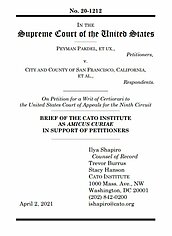Learn more about Cato’s Amicus Briefs Program.
Planning for their retirement, the Pakdels purchased an interest in a six-unit building in San Francisco, which gave them the right occupy to one unit. The Pakdels purchase agreement required all the co-owners of the building to convert their individual interests into separately owned condominiums. Not yet ready to move to San Francisco, the Pakdels rented out their unit to a tenant. San Francisco then amended its condo-conversion ordinance to require converting owners to offer a lifetime lease to any non-owning tenants, in other words the Pakdels’ tenant had to be allowed to rent the unit for the rest of his/her life. As a result, the Pakdels would, in effect, never be able to live in their anticipated retirement home.
The Pakdels filed suit, arguing that the city’s restrictions violate the Fifth Amendment’s Takings Clause, which prohibits the government from taking private property for public use without just compensation. The Ninth Circuit ruled, however, that because the conditions in San Francisco derive from a legislative ordinance rather than an ad hoc permitting condition, no Fifth Amendment violation occurred. The Pakdels have asked the U.S. Supreme Court to set the Ninth Circuit straight by making clear that the Takings Clause prohibits such permitting conditions whether they come from a legislature or a discretionary permitting process.
Cato has filed a brief supporting the Pakdels’ petition to the Court. We argue that there is no basis in the Takings Clause for distinguishing between legislative conditions and ad hoc permitting conditions. To the landowner, the effect is the same: the government imposes onerous conditions before allowing them to use their land. Moreover, legislatively imposed conditions are worse because they have broader effects, thus magnifying the unconstitutional harms to property owners. Finally, there is no reason to expect less abuse from the legislature than from permitting officials. Legislatures are prone to being captured by special interests who demand all sort of exactions from and conditions on landowners. Government officials, whether they are legislators or permitting clerks, often see taking property without compensation as a way to get something for nothing. The Supreme Court should take this case to solidify that property rights are not second-class rights.

This work is licensed under a Creative Commons Attribution-NonCommercial-ShareAlike 4.0 International License.


